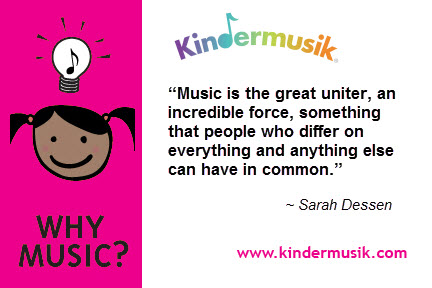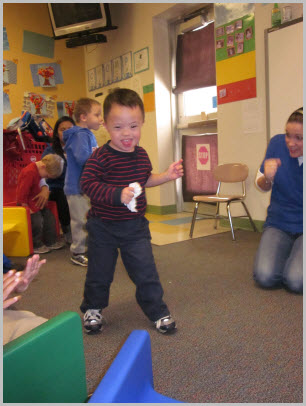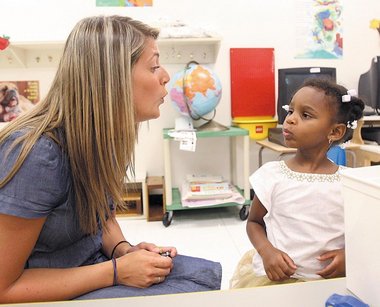 American writer Sarah Dessen is not a Kindermusik teacher nor does she specialize in early childhood special education. However, she seems to understand how music can reach individuals of all
American writer Sarah Dessen is not a Kindermusik teacher nor does she specialize in early childhood special education. However, she seems to understand how music can reach individuals of all
abilities. She wrote: “Music is the great uniter, an incredible force, something that people who differ on everything and anything else can have in common.”
In Kindermusik, we say it this way: “Everyone speaks music.” In the classroom, Kindermusik educators celebrate the individuality and contributions of each child. It’s no wonder music therapists love recommending Kindermusik and teaching Kindermusik. With our similar child-centered philosophies, music therapists are discovering Kindermusik offers opportunities for both their practice and their clients.
4 reasons why music therapists love using Kindermusik as part of a special education curriculum
- The Kindermusik curriculum naturally integrates typically developing children and children with special needs into one welcoming and loving environment.
- Kindermusik classes support the work done in individual music therapy sessions. Music therapists and families appreciate how Kindermusik takes many of the concepts children with special needs work on in occupational therapy, physical therapy, and speech and puts it into a group learning environment.
- Music therapists understand firsthand the benefits of music on children, including cognitive stimulation, self-expression, self-awareness, and increased motor movements.
- Music therapists can use their music therapy skills to reach more children and to expand their income potential.
Teaching children as a Kindermusik educator
“Being able to integrate typically developing children and special needs kids was just a dream come true,” explains Julie Wade, music therapist and Kindermusik educator. “The Kindermusik curriculum enables you to do just that in a positive therapeutic environment.”
Listen to what else Julie loves about being both a music therapist and Kindermusik educator. Plus, hear from her students, too!
Learn more about becoming a Kindermusik educator!



 “I began using ABC Music & Me with my developmentally delayed preschool classroom in the fall of 2011 when it was brought into our school system. The program was ready to use out of the box with a few simple modifications for my students with visual impairments. From the first day of use my students fell in love with the songs, instruments and activities from the unit called Laugh & Learn. I really like the way the program has a wide mix of listening, movement, and instrument activities scattered throughout the lessons. This setup keeps the students actively engaged and prevents their attention from wondering.
“I began using ABC Music & Me with my developmentally delayed preschool classroom in the fall of 2011 when it was brought into our school system. The program was ready to use out of the box with a few simple modifications for my students with visual impairments. From the first day of use my students fell in love with the songs, instruments and activities from the unit called Laugh & Learn. I really like the way the program has a wide mix of listening, movement, and instrument activities scattered throughout the lessons. This setup keeps the students actively engaged and prevents their attention from wondering. In late 2011 I was moved into a classroom for kindergarten to second grade students with Autism at the same school. The school PTA was looking at purchasing a different music program for the class with the previous teacher. After hearing this I instantly contacted Ms. Kerri, my trainer, from ABC Music & Me and began discussing with her what would be the most appropriate level for my new students. Ms. Kerri and I gathered the needed information and I took the proposal for the unit called Move & Groove back to the PTA. After seeing the proposal and hearing my success with the preschool students the PTA agreed to purchase Move & Groove for our Autism programs. We began using our Move & Groove program in August of this year.
In late 2011 I was moved into a classroom for kindergarten to second grade students with Autism at the same school. The school PTA was looking at purchasing a different music program for the class with the previous teacher. After hearing this I instantly contacted Ms. Kerri, my trainer, from ABC Music & Me and began discussing with her what would be the most appropriate level for my new students. Ms. Kerri and I gathered the needed information and I took the proposal for the unit called Move & Groove back to the PTA. After seeing the proposal and hearing my success with the preschool students the PTA agreed to purchase Move & Groove for our Autism programs. We began using our Move & Groove program in August of this year. The transition of programs has been a little bit of adjustment for me as I need to become familiar with the content change. I do make some modifications to meet my students’ developmental needs such as shortening the lessons and taking out areas that may be frustrating for them. Overall we have all enjoyed our new program. Through the use of ABC Music & Me all of my students have started to sing, hum or make vocalizations to the music even my students who are non-verbal. We have also discovered that many of our friends have great rhythm. I am so glad that I was introduced to ABC Music & Me and was able to bring the program to my students.”
The transition of programs has been a little bit of adjustment for me as I need to become familiar with the content change. I do make some modifications to meet my students’ developmental needs such as shortening the lessons and taking out areas that may be frustrating for them. Overall we have all enjoyed our new program. Through the use of ABC Music & Me all of my students have started to sing, hum or make vocalizations to the music even my students who are non-verbal. We have also discovered that many of our friends have great rhythm. I am so glad that I was introduced to ABC Music & Me and was able to bring the program to my students.”



